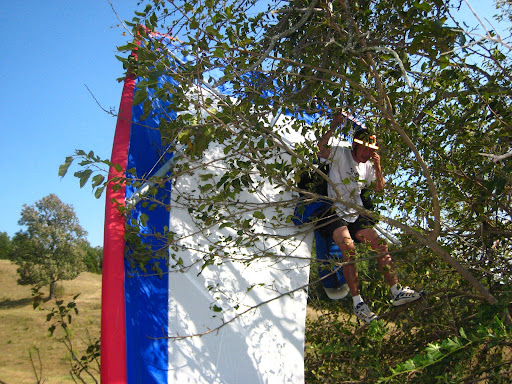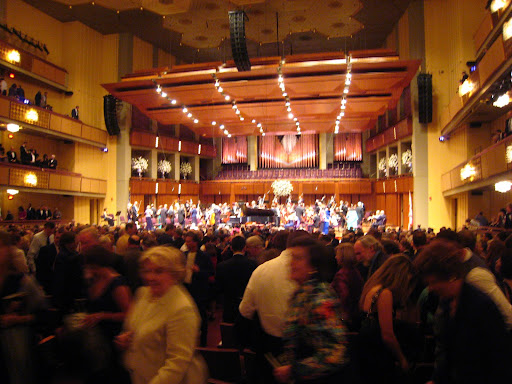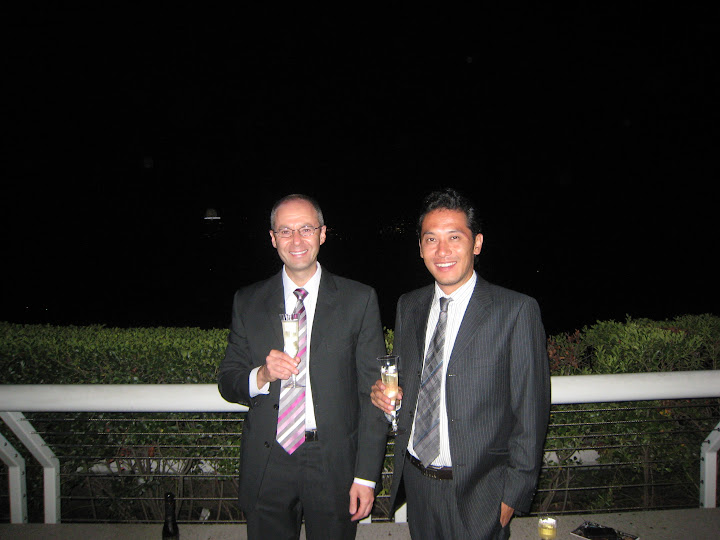Washington, D. C., has been fortunate enough to get Christoph Eschenbach as a new Music Director of the Kennedy Center and of the National Symphony Orchestra. I was really looking forward to attending his inaugural concert, and invited Wanchuk to share this important experience with me. He had planned to go hang-gliding this day, and also he had offered me to go along, and I said I would. Throughout the years I have learned not to plan two major events for one day but we were going to leave the training grounds earlier to have enough time to make it to the 7pm concert.
Everything was going well: Wanchuk had a few good flights, while I was snapping pictures and videos, and in-between jotting down notes for the paper I was about to start writing. The wind was gusty and shifty. I went far into the field to record Wanchuk's last flight for the day. He launched, and on the camera screen I saw the glider making a sudden sharp left turn. Before I knew it he landed on a tree.
When I walked up to the tree I saw Wanchuk hanging upside down a few feet above the ground, struggling to free himself from the harness attached to the glider by a carabine. I know it was a serious, potentially life-threatening accident but I couldn't help chuckling because the situation reminded me a scene from a French movie I watched when I was a boy: Perched on a Tree with the great Louis de Funès.


After a few attempts Wanchuk managed to slip out of the harness and get to the ground—shaken but otherwise unhurt, save for a few scratches. Given the shock of what he had just been through, however, it was not at all clear that he would be able to drive back, much less make it to the concert. Yet, in a few minutes he managed to pull himself together. Not only did he drive us back to town but he also drove to the Kennedy Center, and we were there two minutes before the start of the performance!

The NSO Season Opening Concert is a big social event in D. C.—it was fun to watch the public in evening dresses, tuxedos, and even formal kimonos. The program featured two pieces by Johann Strauss Jr., “Four Last Songs” for soprano and orchestra by Richard Strauss, with Renée Fleming, and Liszt's Piano Concerto No. 1, with Lang Lang. Eschenbach took some liberties with the Johann Strauss's tempi but the orchestra sounded bright and lively. In Richard Strauss's songs Eschenbach elicited from the orchestra lush, rich sound, with complex harmonies saturating the air.
Wanchuk later said that he liked the Strauss a lot but Fleming's voice was a little flat and did not soar over the orchestra, which is exactly how it was. You gotta admire the guy: with no background in classical music, to like Richard Strauss(!), of all composers, and to make such a perceptive remark—all that just a few hours after having a pretty dangerous accident! He likes stitching together different worlds/scenes though, like being out in the field hang-gliding one hour, and wearing suit and tie at the Kennedy Center Gala the next.
Before we entered the Concert Hall I ordered a glass of champagne to pick up during the intermission. Imagine my surprise when, upon exiting the Hall after the first segment, we found tables groaned with wine, champagne, and sparkling water! The Brute I ordered was better than the free champagne though…or, at least, I'd like to think so.

Lang Lang's Liszt was excellent; in fact, every time I see Lang Lang I find that his playing gets better and better. For an encore, sitting side by side at the grand piano, Eschenbach and Lang Lang played two pieces from Debussy's “Petite Suite”—that was great.
The concert was followed by Opening Ball (by invitation only). Since there was nobody checking invitations, we decided to check out what was going on and ended up crashing a pre-dinner reception. I am not a big fan of white wine but I must admit that the one served there was exceptionally good.


Ended the evening with a dinner with Wanchuk and Matt at the Slaviya restaurant in Adams-Morgan: great Balkan food but unbearably loud techno music.
Read Wanchuk's blog entry.






